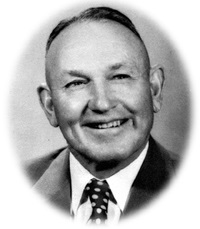
WASHINGTON COUNTY HISTORICAL SOCIETY (Washington County, Utah)
BIOGRAPHY OF LELAND "LEE" HAFEN (1895-1959)
by Richard & Marti Hafen
In 1911, Lee was one of the first students to enter the Dixie Academy. A fine athlete, he was an All-State member of the first Dixie basketball team to make an appearance in the state tournament. The die had been cast for his passion with athletics. After graduation from the Dixie Academy, he attended the Agricultural College in Logan and then BYU, graduating in 1917. He would obtain subsequent degrees at Utah State University and BYU over the coming years.
His teaching career began in Santa Clara, Utah in 1917; and in December of that same year Lee married Elsie Barbara Frei, also from Santa Clara, in the St. George Temple. Shortly after their marriage, the United States became involved in World War I, and Lee joined the United states Army being assigned to the Signal Corps. During his service he sustained a chronic hip injury that would give him trouble throughout his life. Upon his return home, he was welcomed not only by Elsie, but a new baby girl -- Maxine born in October 1918. Over the coming years four sons: Keith Leland (1921), Clark Jacob (1926), Stanley Harmon (1931), and Richard Lee (1939) would bless Lee & Elsie's life. Sadly, Keith, a B-17 bomber pilot during World War II, was killed in action on March 31, 1943. The St. George VFW Post is named in his memory along with Garth Cottam.
After his military service, Lee's roll as an educator went into high gear, and would make him a legend for his time. He taught one year in Hurricane and then in 1921 joined the faculty at Woodward for the next five years. In 1926 he signed on as athletic coach at Dixie High School and Dixie College in the sports of basketball and track and field. From this point forward he would be affectionately called "Coach" by all who knew him. For the next twenty years he guided the athletic program at Dixie both as a coach and Athletic Director -- taking Dixie High into the national spotlight. In 1928, his players won the state basketball championship and went on to the National High School Championship Tournament in Chicago. They won the first two games. His teams also won 13 division championships which qualified them to play for the state championship. This is particularly noteworthy as at that time in sports there was no classification system for high schools based upon student population: the "small guys" played the "big guys". Utah's Dixie had been put on the sports map!
Coach Lee's life-long dream was realized in 1957 when an ultra-modern fieldhouse was built on the future site of Dixie State College. It was considered the finest basketball facility between Provo and Los Angeles. During his career, Lee's contributions to sports in Utah were recognized and well documented by both "The Deseret News" and "The Salt Lake Tribune", and other publications and organizations. He was also recognized posthumously when he was one of the first inductees into the Dixie State College Hall of Fame in 1998, and one of the first inductees into the Dixie State College Athletics Hall of Fame in 2008.
In addition to his strong love for his family, his love for sports, and his love for "Dixie", he loved to farm and breed cattle. During the summer months, he was employed by the BLM to patrol the Arizona strip for fires, and discuss management issues with the cattlement working the Strip. His mild manner and savvy ways made him right for the job.
On November 23, 1959, at the age of 64, Coach Lee died of complications from surgery. The city of St. George mourned its loss. His beloved "Dixie" honored him by holding his funeral in the St. George Tabernacle. His cousin, State Senator Orville Hafen, stated in his eulogy: "Coach Lee's outstanding quality was that he liked people and considered it a rare privilege to have a friend and a great opportunity to be one". He continued: "I have often been asked just what is this thing called 'Dixie Spirit' and how did it come about? I tell them that if you look to the west you will see the big 'D' on the black hill; if you look to the north you will see 'Dixie' on the red cliffs; and, down in the valley, inbetween, there is Lee Hafen".